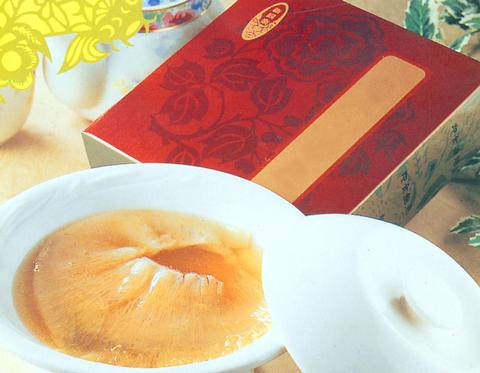Every region's cuisine has its distinctive delicacies. The French crave goose liver, the Italians want white truffles, and the Japanese seem to go for any kind of exotic fish.
So what about the Chinese? Chinese specialties abound, but one of the most unique is shark's fin. Apparently shark fin is currently more in demand than ever -- probably because of its alleged aphrodisiac properties.

PHOTO: COURTESY SUN TUNG LOK RESTAURANT
Quality first
"No mater how you look at it, there is some kind of mystique and magic about shark's fin," said Denis Leung, assistant general manager from Sun Tung Lok, the upscale restaurant that has made itself a name serving the highest quality shark's fin in Hong Kong and Taipei.
It is true that the texture itself is incomparable. The broth, in which it is served, is prepared with extreme care and attention and although no seafood is added to the broth in its preparation, the soup enhances perfectly the unique taste of the dish.
And even though a bowl costs close to NT$1500 (assuming you are getting the real thing), diners seem ready to pay. "Fortunately people know that shark's fin is not obtained through industrial means. Nobody can control the catch and if the demand increases, then prices also go up. This is what is happening right now. Rising orders, especially from China, are are driving prices higher. We are lucky because having been in the trade for more than 30 years, we are almost ensured of constant and direct access to the best quality" Leung said.
Laborious process
"We have our own factory in which we process the raw material before having it distributed to our outlets in Hong Kong and Taipei. This is beneficial for our clients because no matter where they go, they are ensured to get a very consistent product.
"The Tokyo fish market, the largest of its kind in the world, is our only source. The fins are dried either under the sun or in our factory. After one week each piece is carefully cleaned to remove the sand on the skin. Then they are boiled gently to facilitate the removal of the bone. They are cooked again from four to eight hours, according to their size, with ginger, onions, spring onions, and Chinese wine, this time to neutralize the `fishy' taste. Afterwards each piece is placed on a rattan tray to dry and later stored in cold temperature," Leung said.
The price fluctuates according to the length of the fin. Large ones are more expensive but there is no difference in the taste compared with small ones. In Hong Kong, customers seem to be less particular about size or color than their Taiwanese counterparts. "Here," Leung said, "Consumers want a whole piece in their bowl and they even comment on the color. If the piece is darker it is because it has been impregnated by blood when the shark was caught."
Final touch
The broth takes eight hours to produce and is made of chicken, Chinese ham, and pork loin. The soup is cooked first under a high fire, which is gradually reduced -- a process in which the solid ingredients lose 50 percent of their weight. The result is a very rich and flavored soup.
The dish is properly served steaming hot. Most do not add anything to the dish, although some enhance the flavor with bean sprouts or Chinese parsley.
Ever-entrepreneurial, Sun Tung Lok has also thought of a solution for those planning an intimate dinner in the secrecy of their home -- a ready made, vacuum-packed shark's fin soup that only needs to be re-heated.
The outspoken Leung is bullish about the future. "No matter the state of the economy, people know that we are not at the lower end of the market, but we deliver quality. And if the product itself gets overpriced, customers will gently switch to eating bird's nest or abalone," Leung said.
And for the fake
Yes, some establishments do serve fake shark's fin. It is a pity because there is simply no substitute for original. How can you see it? Take a tiny piece and try to reduce it to pieces fine as sand. If it sticks together, then it's not the real thing.
Long ago, the promoters of the Champagne Taittinger came up with a simple hence classy advert punch line "Should it be only once in your life?" This also applies to shark's fin. Try it soon.
For Your Information:
Sun Tung Lok Shark's Fin Restaurant (新同樂魚翅餐廳) is located at 34, Tunhua S. Rd., Sec 2. (敦化南路二段34號); tel: 2700 1818. A second branch is at 2, Lane 232, Tunhua S Rd., Sec 1 (敦化南路一段232巷2號); tel: 2752 9797

In recent weeks the Trump Administration has been demanding that Taiwan transfer half of its chip manufacturing to the US. In an interview with NewsNation, US Secretary of Commerce Howard Lutnick said that the US would need 50 percent of domestic chip production to protect Taiwan. He stated, discussing Taiwan’s chip production: “My argument to them was, well, if you have 95 percent, how am I gonna get it to protect you? You’re going to put it on a plane? You’re going to put it on a boat?” The stench of the Trump Administration’s mafia-style notions of “protection” was strong

Every now and then, it’s nice to just point somewhere on a map and head out with no plan. In Taiwan, where convenience reigns, food options are plentiful and people are generally friendly and helpful, this type of trip is that much easier to pull off. One day last November, a spur-of-the-moment day hike in the hills of Chiayi County turned into a surprisingly memorable experience that impressed on me once again how fortunate we all are to call this island home. The scenery I walked through that day — a mix of forest and farms reaching up into the clouds

With one week left until election day, the drama is high in the race for the Chinese Nationalist Party (KMT) chair. The race is still potentially wide open between the three frontrunners. The most accurate poll is done by Apollo Survey & Research Co (艾普羅民調公司), which was conducted a week and a half ago with two-thirds of the respondents party members, who are the only ones eligible to vote. For details on the candidates, check the Oct. 4 edition of this column, “A look at the KMT chair candidates” on page 12. The popular frontrunner was 56-year-old Cheng Li-wun (鄭麗文)

“Eighteen years ago, people didn’t even know the name of this ingredient,” says 58-year-old Gil Sa-hyeon, holding up a cluster of dried brownish stems. “Now it’s everywhere.” His shop, Joseon Yakcho, sits in the heart of Seoul’s Yangnyeongsi Market, South Korea’s largest traditional medicinal herb market, its streets lined with shops displaying buckets of herbs such as licorice root and cinnamon bark that spill on to the pavements, filling the air with their distinct, earthy aroma. The ingredient Gil is referring to is hovenia dulcis, known in Korean as heotgae — the oriental raisin tree that’s become the cornerstone of South Korea’s